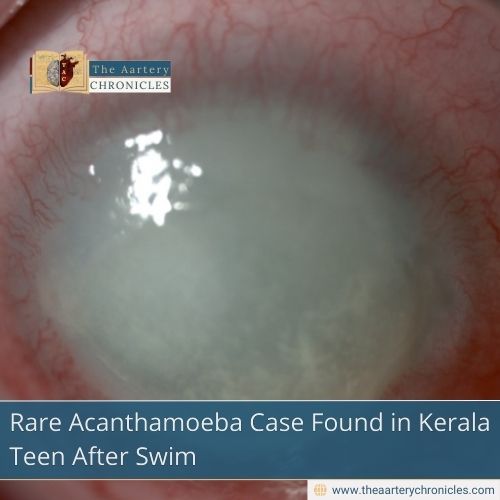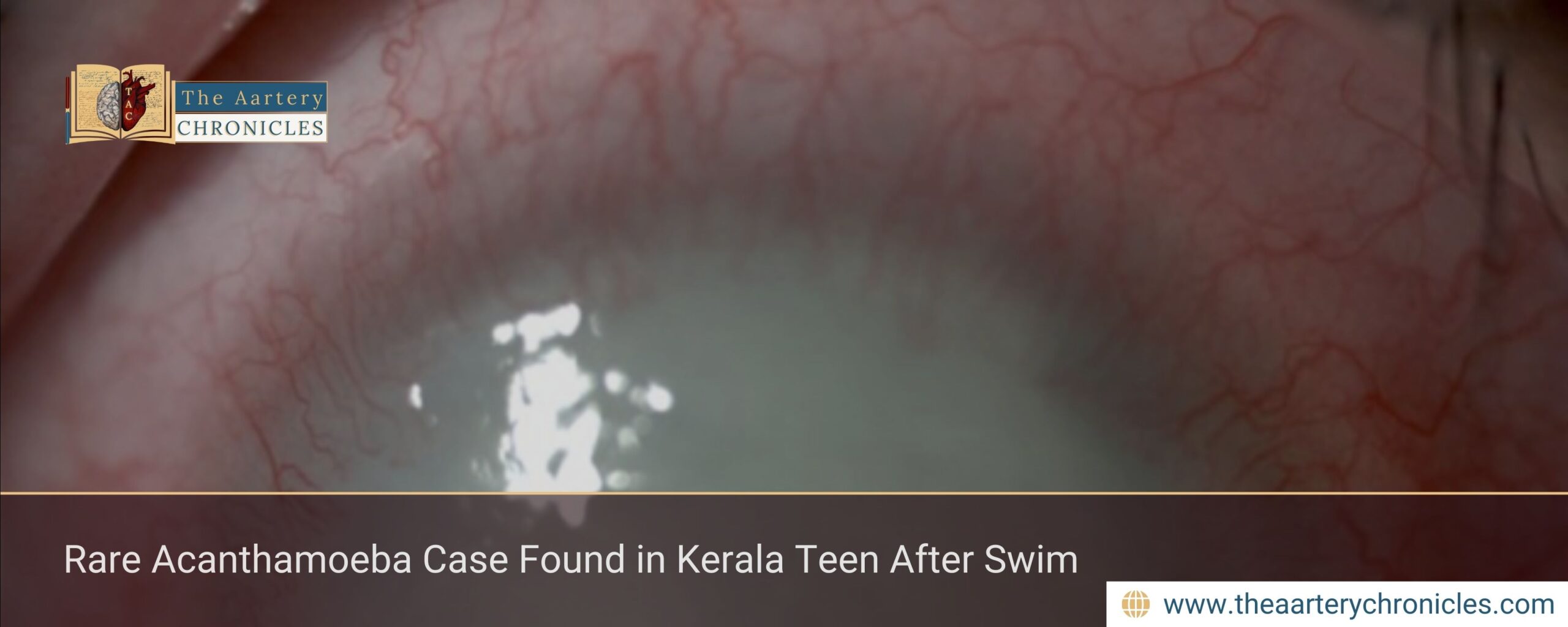

Rare Acanthamoeba Case Found in Kerala Teen After Swim
An 18-year-old boy has been diagnosed with a rare Acanthamoeba infection at the Government Medical College Hospital in Thiruvananthapuram. Doctors confirmed that the teenager, currently receiving treatment with miltefosine, is in a stable condition.
Early Symptoms and Diagnosis
The youth first developed fever, severe headache, and dizziness on August 18 and sought care at a private hospital in Kanjiramkulam. As his illness worsened, he was shifted to other facilities, including Neyyatinkara and, later, a city-based private hospital.
Initial cerebrospinal fluid (CSF) tests did not detect any infection. However, further PCR analysis carried out in Coimbatore confirmed the presence of Acanthamoeba, leading to the diagnosis.
How Did the Infection Occur?
Health authorities suspect that the infection was linked to swimming in a public pool at Akkulam Tourism Village on August 16. The teenager reportedly swam and dived without using a nose clip, which may have allowed the amoeba to enter through his nasal passages.
While six of his friends also swam in the same pool that day, none have shown symptoms so far. As a precaution, the District Tourism Promotion Council (DTPC) has shut down the pool for cleaning and disinfection. Water samples have been sent for PCR testing, and the facility will reopen only after it is declared safe.
What Is Acanthamoeba?
Acanthamoeba is a microscopic organism commonly found in soil, dust, and various water sources such as lakes, swimming pools, hot tubs, and even tap water. Unlike some other parasites, it does not spread from person to person. Instead, infections occur when the amoeba enters through the eyes, nose, or broken skin.
This organism can cause three major illnesses:
- Acanthamoeba keratitis – an eye infection often seen in contact lens users.
- Granulomatous amoebic encephalitis (GAE) is a rare but life-threatening infection of the brain and spinal cord.
- Disseminated infections – where the amoeba spreads to the skin, lungs, or other organs.
Current Situation in Kerala
Thiruvananthapuram district currently has nine active cases of amoebic meningoencephalitis, with two deaths reported this year, both in patients with pre-existing health conditions. In 2024, Kerala recorded a sharp rise in free-living amoeba infections, including cases caused by Naegleria fowleri and Vermamoeba vermicularis.
Some past cases were linked not just to swimming pools but also to pipe water exposure, raising public concerns about water safety in households as well as recreational sites.
Symptoms and Warning Signs
Doctors caution that Granulomatous amoebic encephalitis (GAE) often develops slowly and is difficult to diagnose early. Symptoms may include:
- Severe headache
- Fever and nausea
- Vomiting
- Confusion
- Seizures
- Loss of balance or coordination
Preventive Measures
Public health experts emphasise the importance of preventing Acanthamoeba infection through safe water practices. Simple steps include:
- Avoid swimming in poorly maintained or unchlorinated pools.
- Wearing a nose clip when swimming or diving.
- Use sterile solutions, not tap water, to clean contact lenses.
- Ensuring both recreational and household water sources are properly treated and tested.
Source: Inputs from various media Sources
Conclusion


Rare Acanthamoeba Case Found in Kerala Teen After Swim
An 18-year-old boy has been diagnosed with a rare Acanthamoeba infection at the Government Medical College Hospital in Thiruvananthapuram. Doctors confirmed that the teenager, currently receiving treatment with miltefosine, is in a stable condition.
Early Symptoms and Diagnosis
The youth first developed fever, severe headache, and dizziness on August 18 and sought care at a private hospital in Kanjiramkulam. As his illness worsened, he was shifted to other facilities, including Neyyatinkara and, later, a city-based private hospital.
Initial cerebrospinal fluid (CSF) tests did not detect any infection. However, further PCR analysis carried out in Coimbatore confirmed the presence of Acanthamoeba, leading to the diagnosis.
How Did the Infection Occur?
Health authorities suspect that the infection was linked to swimming in a public pool at Akkulam Tourism Village on August 16. The teenager reportedly swam and dived without using a nose clip, which may have allowed the amoeba to enter through his nasal passages.
While six of his friends also swam in the same pool that day, none have shown symptoms so far. As a precaution, the District Tourism Promotion Council (DTPC) has shut down the pool for cleaning and disinfection. Water samples have been sent for PCR testing, and the facility will reopen only after it is declared safe.
What Is Acanthamoeba?
Acanthamoeba is a microscopic organism commonly found in soil, dust, and various water sources such as lakes, swimming pools, hot tubs, and even tap water. Unlike some other parasites, it does not spread from person to person. Instead, infections occur when the amoeba enters through the eyes, nose, or broken skin.
This organism can cause three major illnesses:
- Acanthamoeba keratitis – an eye infection often seen in contact lens users.
- Granulomatous amoebic encephalitis (GAE) is a rare but life-threatening infection of the brain and spinal cord.
- Disseminated infections – where the amoeba spreads to the skin, lungs, or other organs.
Symptoms and Warning Signs
Doctors caution that Granulomatous amoebic encephalitis (GAE) often develops slowly and is difficult to diagnose early. Symptoms may include:
- Severe headache
- Fever and nausea
- Vomiting
- Confusion
- Seizures
- Loss of balance or coordination
Preventive Measures
Public health experts emphasise the importance of preventing Acanthamoeba infection through safe water practices. Simple steps include:
- Avoid swimming in poorly maintained or unchlorinated pools.
- Wearing a nose clip when swimming or diving.
- Use sterile solutions, not tap water, to clean contact lenses.
- Ensuring both recreational and household water sources are properly treated and tested.
Source: Inputs from various media Sources
Conclusion
I’m a pharmacist with a strong background in health sciences. I hold a BSc from Delhi University and a pharmacy degree from PDM University. I write articles and daily health news while interviewing doctors to bring you the latest insights. In my free time, you’ll find me at the gym or lost in a sci-fi novel.
- Priya Bairagi
- Health News and Updates,People Forum
- 15 September 2025
- 13:00








